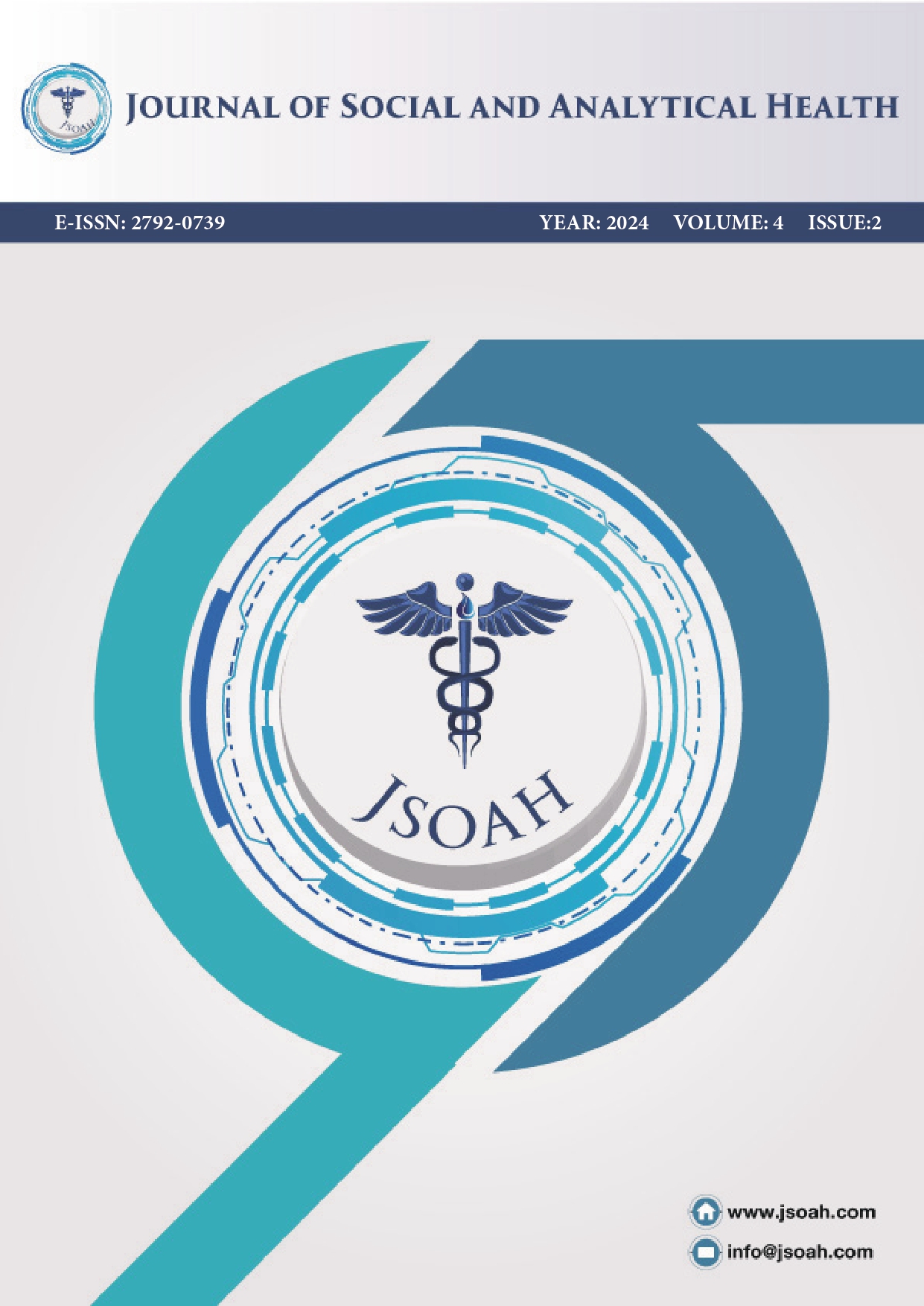Hemşirelik öğrencilerinin hemşirelik bakımına ilişkin metaforik algıları, fenomenolojik bir çalışma
DOI:
https://doi.org/10.5281/zenodo.13377218Anahtar Kelimeler:
Hemşirelik, bebek bakımı, metafor, öğrenci, fenomenolojiÖzet
Amaç: Bu çalışma hemşirelik öğrencilerinin bakım kavramına ilişkin metaforik algılarını analiz etmeyi amaçlamaktadır. Gereç ve Yöntem: Çalışma fenomenolojik araştırma desenine sahiptir. Çalışma Mayıs 2021-Ocak 2022 tarihleri arasında Sağlık Bilimleri Üniversitesi Gülhane Hemşirelik Fakültesi'nde yürütülmüştür. Araştırmanın evrenini 2021-2022 eğitim-öğretim yılı güz döneminde bir üniversitenin hemşirelik fakültesine kayıt yaptıran hemşirelik lisans öğrencileri oluşturdu. Nitel veriler tüm sınıflardan seçilen 78 öğrenci ile toplanmıştır. Veriler, sosyodemografik özelliklere ilişkin sorular ve bakım kavramına ilişkin boşluklu ifadeler içeren yarı yapılandırılmış görüşme formu kullanılarak toplanmıştır. Bulgular: Birden fazla metafor oluşturmalarına izin verilen katılımcılar 51 metafor ifade etmiştir. Bu metaforlar beş temaya dayanmaktadır: hemşireliğin mesleki değerlerine ve etik ilkelerine bağlılık, hasta ihtiyaçlarını bütüncül bir bakış açısıyla değerlendirme ve karşılama, erdemli bir insan olma ve güven verme, iletişim kurma ve empati gösterme becerisine sahip olma, ihtiyaçları karşılama ve sağlığı temel alma. Sonuç: Bu çalışmanın bulguları hemşirelik derslerinin içeriğini hazırlamak ve değerlendirmek için kullanılabilir. Bu bulgular mesleki değerlerin ve hemşirelik öğrencilerinin bakım kavramının anlam ve önemine ilişkin farkındalıklarının geliştirilmesi açısından değerlidir.
Referanslar
Hadadian-Chaghaei F, Haghani F, Taleghani F, Feizi A, Alimohammadi N. Nurses as gifted artists in caring: an analysis of nursing care concept. Iranian J Nurs Midwifery Research. 2022;27(2):125-133.
Doody O, Murphy F, Lyons R, Gallen A, Ryan J, Downey, et al. Development of nursing quality care process metrics and indicators for intellectual disability services: a literature review and modified Delphi consensus study. BMC Health Serv Research. 2019;19(1):909. https://doi.org/10.1186/s12913-019-4749-y
Tsimane TA, Downing C. Transformative learning in nursing education: A concept analysis. International J Nurs Sciences. 2019;7(1):91-98. https://doi.org/10.1016/j.ijnss.2019.12.006
Mudd A, Feo R, Conroy T, Kitson A. Where and how does fundamental care fit within seminal nursing theories: A narrative review and synthesis of key nursing concepts. J Clinical Nursing. 2020;29(19-20):3652-3666. https://doi.org/10.1111/jocn.15420
Isik B, Kaya H, Ozel H. Nurses’ metaphorical perceptions of “care”. International J Caring Sciences. 2020;13 (3);1678-1688.
Turan FD, Soyunmez, S. Perceptions of third- and fourth-year nursing students enrolled in a pediatric nursing course regarding the concept of child abuse: A metaphorical study. Nurse Education Today. 2022;113:105359. https://doi.org/10.1016/j.nedt.2022.105359.
Lunardelli L, Danielis M, Bottega M, Palese A. Anticipated nursing care as perceived by nursing students: Findings from a qualitative study. Nursing Open. 2021; 8(6):3373-3383. Epub 2021 May 3. https://doi.org/10.1002/nop2.883.
Jo KH, An GJ. Death metaphors in korean undergraduate nursing students. Holistic Nursing Practice. 2012;26(2):79-86. 26(2):79-86. https://doi.org/10.1097/HNP.0b013e31824621f3
Hartrick G, Schreiber R. Imaging ourselves: nurses' metaphors of practice. J Holistic Nursing.1998;16(4):420-34. https://doi.org/10.1177/089801019801600404
Yıldırım A, Simsek H. Qualitative research methods in social sciences. J Theory Practice Ed. Ankara: Seckin Publishing. 2006;2 (2): 113-118. 2005, 366
O'Brien CB, Harris IB, Beckman JT, Reed AD, Cook AD. Standards for reporting qualitative research: a synthesis of recommendations. Academic Medicine. 2014; 89(9):1245-51.https://doi.org/10.1097/ACM.0000000000000388
Lakoff G, Johnson M. (1980). Metaphors We Live By. University Chicago Press. Chicago and London. 256p.
Altın I. Nurses' metaphor perceptions and care behaviors regarding the concept of care. [Master's Thesis]. Yozgat. Bozok University. 2019. 134 p.
Kale E, Cicek U. Nurses' perceptions of metaphors regarding their own professions. J Health Nurs Management. 2015;2(3): 142-151. https://doi.org/10.5222/SHYD.2015.142 Turkish.
Colaizzi FP. Psychological research as a phenomenologist views it. In Ronald S. Valle & Mark King (eds.), Existential-phenomenological alternatives for psychology. New York: Oxford University Press. pp. 6 (1978).
Akpınar RB, Coban GI. Analysis of nursing students’ perceptions through metaphors for nurse and patient concepts. J Nursology. 2022;25(4):238-244. https://doi.org/10.5152/JANHS.2022.222746 Turkish.
Kardas C, Unlusoy DN. Metaphor analysis for holistic nursing care: creating a puzzle. Dokuz Eylul University Faculty Nurs Electronic J. 2022;15(3): 317-327. https://doi.org/10.46483/deuhfed.977034 Turkish.
Fawcett J. Contemporary nursing knowledge analysis and evaluation of nursing models and theorisee. Second Edition. Philedelphia: F. A. Davis Company. 2006; 364-437.
Deliktas A, Korukcu O, Aydin R, Kabukcuoglu K. Nursing students' perceptions of nursing metaparadigms: a phenomenological study. J Nursing Research. 2019; 27(5): e45. https://doi.org/10.1097/jnr.0000000000000311
Conroy T. Factors influencing the delivery of the fundamentals of care: Perceptions of nurses, nursing leaders and healthcare consumers. J Clinical Nursing. 2017;27(11-12):2373-2386. https://doi.org/10.1111/jocn.14183
Feo R, Kitson A, Conroy T. How fundamental aspects of nursing care are defined in the literature: A scoping review. J Clinical Nursing. 2018; 27(11-12):2189-2229. https://doi.org/10.1111/jocn.14313
Meng M, Zhang X, Jiang A. A theoretical framework of caring in the Chinese context: a grounded theory study. J Advanced Nursing. 2011; 67(7):1523-36. https://doi.org/10.1111/j.1365-2648.2010.05573.x
Karaoz S. Turkish nursing students’ perception of caring. Nurs Educ Today. 2005; 25(1):31-40. https://doi.org/10.1016/j.nedt.2004.09.010
Hu S, Chen J, Jiang R, Hu H, Hu Z, Gao X, et al. Caring ability of nursing students pre- and post-internship: a longitudinal study. BMC Nursing. 2022;21:133. https://doi.org/10.1186/s12912-022-00921-2
Chan ZCY, Chien WT, Henderson S. Metaphorical interpretations of the educator-student relationship: an innovation in nursing educational research. Nurse Educ Practice. 2018;28:46-53. https://doi.org/10.1016/j.nepr.2017.09.012
Monroe HA, Nurses’ professional values: influences of experience and ethics education. J Clinical Nursing. 2019; 28(9-10):2009-2019. https://doi.org/10.1111/jocn.14806
Poorchangizi B, Borhani F, Abbaszadeh A, Mirzaee M, Farokhzadian J. Professional values of nurses and nursing students: a comparative study. BMC Medical Educ. 2019;19, 438. https://doi.org/10.1186/s12909-019-1878-2
Jasemi M, Valizadeh L, Zamanzadeh V, Keogh B. A concept analysis of holistic care by hybrid model. Indian J Palliat Care. 2017;23(1):71-80. https://doi.org/10.4103%2F0973-1075.197960
Sellman D. Virtue ethics and nursing practice. In: Scott, P. (eds) Key Concepts and Issues in Nursing Ethics. Springer, Cham. 2017. https://doi.org/10.1007/978-3-319-49250-6_4
Russell MJ. Teaching civility to undergraduate nursing students using a virtue ethics-based curriculum. J Nurs Educ. 2014;53(6):313-9. https://doi.org/10.3928/01484834-20140512-03
Ozturk A. The effect of nursing communication training on empathy and communication skills of nursing students: a quasi-experimental study. OPUS International J Society Researches. Administration & Organization Special Issue. 2021;18:1120-1135. https://doi.org/10.26466/opus.888874
Kahriman I, Nural N, Arslan U, Topbas M, Can G, Kasim S. The effect of empathy training on the empathic skills of nurses. Iran Red Crescent Med J. 2016;18(6):e24847. https://doi.org/10.5812%2Fircmj.24847.
İndir
Yayınlanmış
Nasıl Atıf Yapılır
Sayı
Bölüm
Lisans
Telif Hakkı (c) 2024 Journal of Social and Analytical Health

Bu çalışma Creative Commons Attribution-NonCommercial 4.0 International License ile lisanslanmıştır.


